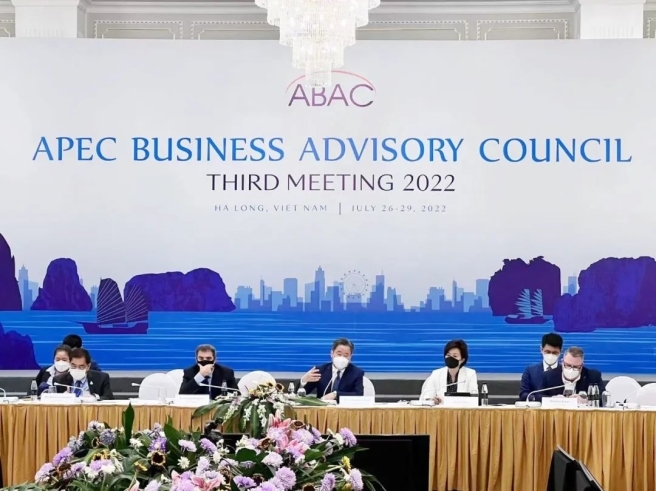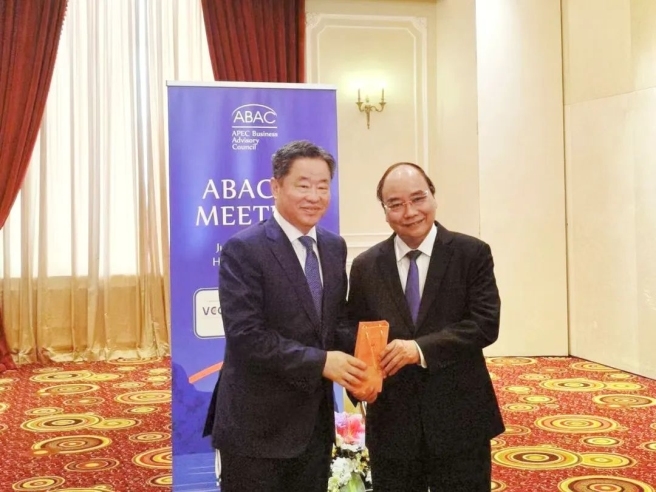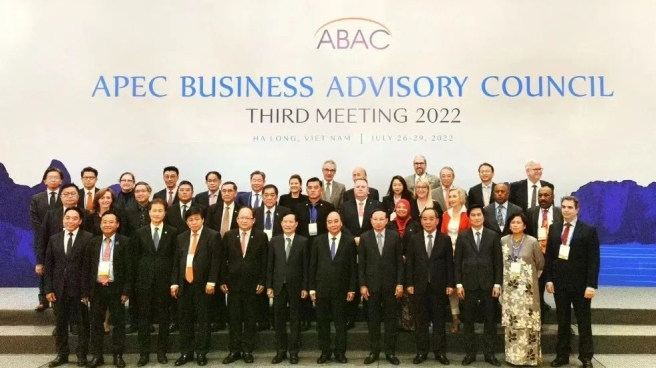Frank Ning Attends the Third Meeting of ABAC 2022
Sinochem Holdings Chairman Frank Ning, as the Chair of Sustainability Working Group of the APEC Business Advisory Council (ABAC), attended the third meeting of ABAC 2022, which was held in Halong Bay, Vietnam from July 26 to 29. Also present at the meeting were over 100 ABAC members, alternate members and staffers from 21 economies in the Asia-Pacific region.

On July 26, Frank Ning met with the ABAC Chair, and consulted on key issues with the host economy of APEC, Thailand, delivering positive results.

On the morning of July 27, Mr. Ning attended a meeting between Vietnamese President Nguyen Xuan Phuc and ABAC members, in which he shared China’s economic development achievements and business development of Sinochem Holdings. Later, Ning attended ABAC’s opening plenary and expressed views on global economic trends, climate change, renewable energy and food security. In the afternoon, he paid a visit to the Vietnam Economic and Technological Development Zone and had in-depth exchanges with ABAC Vietnam, entrepreneurs and government officials on economic and trade cooperation between the two sides.
On July 28, Frank Ning chaired the Sustainability Working Group meeting, discussing seven proposals raised. Ning noted that the theme of “Embrace, Engage, Enable” proposed by Thailand, the host economy of 2022, well reveals an amicable, interactive and empowering gesture of ABAC. Based on ABAC work program in 2022 and major trends in the Asia-Pacific region, the Sustainability Working Group will continue to work on the three priorities in 2022, namely climate change, renewable energy and food security, with focuses on three areas: “Building Net-Zero Economy and Promoting Green Recovery in APEC, Advancing Realistic Energy Transition towards Low Carbon in APEC, and Fostering a Sustainable Food System that Ensures Food Security and Safety in APEC.”
At the meeting, Frank Ning submitted a proposal on “Accelerating Chemical Technology Innovation and the Global Low-carbon Transition.” He stated that the chemical industry is an important part of the modern industrial system, accounting for about 17% of the value of global industrial output. Additionally, as a typical high energy-consuming industry, the chemical industry is also an important source of carbon emissions and faces greater difficulty in cutting emissions. As an important low-carbon solution provider, the chemical industry has launched a series of technological innovation initiatives that not only help the chemical industry save energy and reduce carbon emissions, but also facilitate the low-carbon transformation of other industrial chains through chemical solutions.
Presently, leading chemical companies such as BASF and Sinochem Holdings are continuously innovating and contributing to low-carbon solutions. Sinochem Holdings in particular is actively exploring and applying energy-saving and carbon-reducing technological measures that are focused on carbon capture, utilization and storage technology (CCUS), carbon dioxide-based chemicals and hydrogen energy. These measures have achieved certain results but require additional industrial and policy support to accelerate the application of advanced technologies.
Frank Ning raised five recommendations for the low-carbon transformation of the chemical industry. He pointed out that in the process of industrial transformation, APEC governments particularly need to provide financial and policy support. He also expressed that the financial industry should provide diversified support to the chemical industry to facilitate the financing for high capital expenditure (CAPEX) or high-risk projects.
Up to now, Frank Ning submitted three proposals, “Advancing Sustainable Low-Carbon Transition for Energy-Intensive Enterprises”, “Developing Regenerative Agriculture as Part of the Solution to Climate Change” and “Accelerating Chemical Technology Innovation and the Global Low-carbon Transition.” These proposals well encompass the green and low-carbon transition of three major industries: energy, agriculture and chemicals. The proposals were all endorsed, with relevant policy recommendations incorporated into ABAC’s Report to APEC Economic Leaders.
On 29 July, Frank Ning attended the closing plenary. He highlighted the outcomes of the Sustainability Working Group meeting and submitted a letter drafted by the Sustainability Working Group to the APEC Food Security Ministers. Both were endorsed by ABAC members, and contributed to the fulfillment of ABAC Work Program for 2022.



 CN
CN PC
PC


